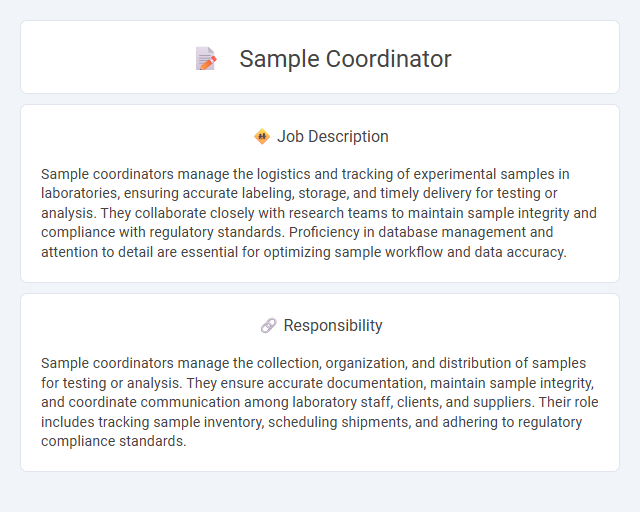
Sample coordinators manage the logistics and tracking of experimental samples in laboratories, ensuring accurate labeling, storage, and timely delivery for testing or analysis. They collaborate closely with research teams to maintain sample integrity and compliance with regulatory standards. Proficiency in database management and attention to detail are essential for optimizing sample workflow and data accuracy.
Individuals with strong organizational skills and attention to detail are likely suitable for a Sample Coordinator role, as it requires managing sample logistics efficiently. People who thrive in structured environments and excel in communication may have a higher probability of success in this position. Conversely, those who struggle with multitasking or prefer less repetitive tasks might find this job challenging.
Qualification
A Sample Coordinator requires a strong background in laboratory procedures and quality control with a minimum of a bachelor's degree in life sciences, biotechnology, or a related field. Proficiency in sample management software, attention to detail, and excellent organizational skills are essential to ensure accurate tracking and handling of samples. Experience in coordinating logistics, maintaining compliance with regulatory standards, and collaborating with cross-functional teams is highly valued.
Responsibility
Sample coordinators manage the collection, organization, and distribution of samples for testing or analysis. They ensure accurate documentation, maintain sample integrity, and coordinate communication among laboratory staff, clients, and suppliers. Their role includes tracking sample inventory, scheduling shipments, and adhering to regulatory compliance standards.
Benefit
A sample coordinator position likely offers significant benefits such as enhanced organizational skills and experience in inventory management, which can improve career prospects in logistics or quality control fields. The role may provide opportunities for developing strong communication capabilities, essential for coordinating between different departments and external suppliers. Candidates might also benefit from exposure to industry-specific software and processes, increasing their technical proficiency and marketability.
Challenge
Sample coordinator roles often involve managing complex logistics and tight deadlines, which can present significant challenges in ensuring accurate and timely sample delivery. Coordinating between multiple departments and external vendors increases the probability of encountering communication gaps or delays. Effective problem-solving skills and attention to detail are likely essential to overcoming these challenges and maintaining workflow efficiency.
Career Advancement
Sample coordinators play a crucial role in managing laboratory samples, ensuring accurate tracking, and compliance with regulatory standards. Mastery in data management and quality control can lead to advancement opportunities such as senior coordinator or laboratory manager positions. Gaining expertise in specialized software and leadership skills significantly enhances career growth prospects within clinical research and pharmaceutical industries.
 kuljobs.com
kuljobs.com